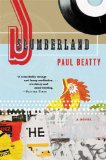Summary | Excerpt | Reading Guide | Reviews | Beyond the book | Read-Alikes | Genres & Themes | Author Bio

A Novel
by Paul BeattyFerguson Sowell is a man on a mission to transcend himself. In
his guise as DJ Darky, he's looking to lay down the perfect beat, "the
confluence of melody and groove that transcends mood and time." But his
quest is motivated as much by a need to obliterate sound as to create it. DJ
Darky has a phonographic memory. "I remember everything I've ever heard. Every
dropped nickel, raindrop drip-drop, sneaker squeak, and sheep bleat," he
tells us. "It's like my entire life is a song I can't get out of my head."
And so he painstakingly composes a two-minute-and-forty-seven-second piece, a
song to pause sound and broadcast his individuality, made up out of "Brando's
creaking leather jacket in The Wild One, a shopping cart tumbling down
the concrete banks of the L.A. River, Mothers of Invention, a stone skimming
across Diamond Lake, the flutter of Paul Newman's eyelashes amplified ten
thousand times.…" And so on.
All he needs now is someone to ratify it, approve it by playing over it, and the
only one who will do is an unknown, avant-garde jazz musician named Charles
Stone, a.k.a. the Schwa, because "his sound, like the indeterminate vowel, is
unstressed, upside-down, and backward." The Schwa hasn't been seen in
decades, and DJ Darky's quest takes him into a conspiratorial labyrinth when a
porn tape leads him to Berlin, a Stasi officer, and a bar called the Slumberland,
where American black men are draped with blond Germanic women. While waiting for
the Schwa to pass through the bar, DJ Darky takes a job programming the
Slumberland's jukebox with "‘Goddamn, get off your ass and jam' eclecticism".
DJ Darky's art, though, is not confined to arcane musical subcultures. He views
his creative output as intensely political—or rather post-political. Blackness
is passè, he informs us at the beginning.
The American black man (and he only discusses black men, not women) is no longer
an object of violent envy, lust, and denigration, merely a historical actor like
any other. DJ Darky wants to commemorate his freedom from symbolic entrapment
with the radical sampling of his piece. But he's haunted by an eccentric black
man who wants to rebuild the Berlin Wall and return to the days of racial
stratification. He frequents the Slumberland wearing a sign that says, "HOW CAN WE READ THE WRITING ON THE WALL, IF THERE IS NO WALL." Anyone who doesn't
contribute a brick to his effort to rebuild the wall gets a grimy finger stuck
in his drink. As the novel progresses, DJ Darky zeroes in on the Schwa. The
question that remains is whether the music they'll make together will erase or
reinscribe blackness in its essentialized form.
Beatty's own style is Ishmael Reed laid down on a track of Thomas Pynchon.
From the moment that DJ Darky steps out of his tanning bed and onto the streets
of Berlin (tanning being the black person's prerogative in a post-racial
society), he commences a sardonic scat about everything in sight—the myth of the
exclusivity of Negro expression, the relationship between slavery and jazz
improvisation, the emperor penguins in the Berlin zoo. He is restless and
unstoppable, a jukebox for cultural commentary with an edge. But it doesn't
always work: "Thirty more seconds of her impeccable drum work caused my ego to
slide off an inverted ratamacue in the obstinate voice as if it were a wet,
slippery, moss-covered river rock in an Appalachian class-five rapid. Barely
able to keep my head above water, I gave myself up to the current."
Passages like this make it impossible for the reader to give herself up to the
current of Beatty's language. He's trying far too hard.
Beatty is clearly not aiming for realism, though, and most of the time his
brash, hopped-up riffs are electric. DJ Darky finally finds the Schwa and
witnesses his first live performance in several decades: "The Schwa ruffled the
pages of the book over his pant seam, and the resulting sound rivaled that of
the best Max Roach brushwork. I nearly fainted. He lifted the book to his mouth
and played chapter seven like a diatonic harmonica; blowing and drawing on the
pages like leaves of grass in the hands of Pan. Who knew a Signet paperback was
in the key of D?" And what book did the Schwa play? The Sound and the Fury, of course.
If you prefer fleshed-out, psychologically rich characters and a gratifying
plot, this is not the book for you. Slumberland is, rather, a book of
ideas in fictional form. It is intensely thought-provoking and never has time to
be dull as it races through itself. It makes you work to wrap your mind around
racial politics in post-unification Berlin and the relationship between race and
aesthetic form. And it ends on a note that even DJ Darky, with his phonographic
memory, could not have anticipated.
![]() This review was originally published in The BookBrowse Review in July 2008, and has been updated for the
September 2009 edition.
Click here to go to this issue.
This review was originally published in The BookBrowse Review in July 2008, and has been updated for the
September 2009 edition.
Click here to go to this issue.

If you liked Slumberland, try these:

The Brief Wondrous Life of Oscar Wao
by Junot Diaz
Published 2008
Things have never been easy for Oscar, a sweet but disastrously overweight, lovesick Dominican ghetto nerd. Oscar dreams of becoming the Dominican J. R. R. Tolkien and, most of all, of finding love. But he may never get what he wants, thanks to the Fukœ - the curse that has haunted Oscar's family for generations.

by Jonathan Lethem
Published 2004
'A vibrant, sometimes heartbreaking ballad of Brooklyn...prose as supple as silk and as bright, explosive and illuminating as fireworks.'
Your guide toexceptional books
BookBrowse seeks out and recommends the best in contemporary fiction and nonfiction—books that not only engage and entertain but also deepen our understanding of ourselves and the world around us.